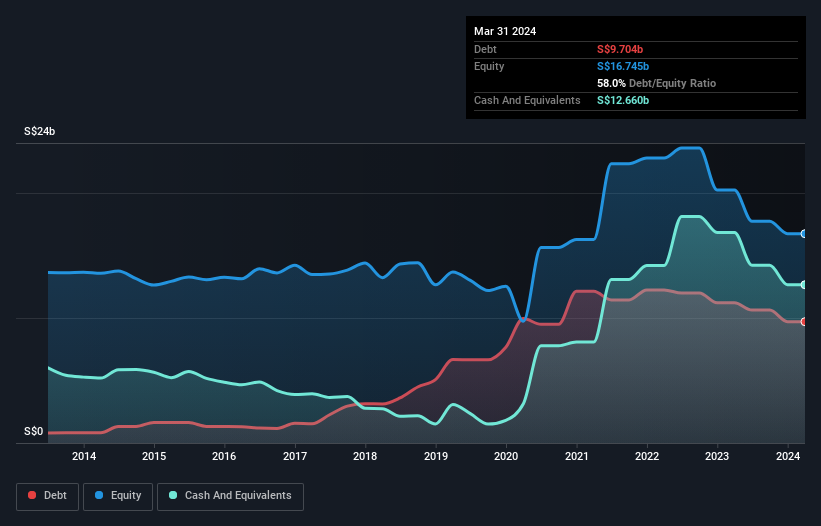Here's Why Singapore Airlines (SGX:C6L) Can Manage Its Debt Responsibly

David Iben put it well when he said, 'Volatility is not a risk we care about. What we care about is avoiding the permanent loss of capital.' It's only natural to consider a company's balance sheet when you examine how risky it is, since debt is often involved when a business collapses. We can see that Singapore Airlines Limited (SGX:C6L) does use debt in its business. But should shareholders be worried about its use of debt?
When Is Debt Dangerous?
Generally speaking, debt only becomes a real problem when a company can't easily pay it off, either by raising capital or with its own cash flow. In the worst case scenario, a company can go bankrupt if it cannot pay its creditors. However, a more common (but still painful) scenario is that it has to raise new equity capital at a low price, thus permanently diluting shareholders. By replacing dilution, though, debt can be an extremely good tool for businesses that need capital to invest in growth at high rates of return. The first step when considering a company's debt levels is to consider its cash and debt together.
Check out our latest analysis for Singapore Airlines
What Is Singapore Airlines's Debt?
You can click the graphic below for the historical numbers, but it shows that Singapore Airlines had S$9.70b of debt in March 2024, down from S$11.2b, one year before. But it also has S$12.7b in cash to offset that, meaning it has S$2.96b net cash.

How Strong Is Singapore Airlines' Balance Sheet?
The latest balance sheet data shows that Singapore Airlines had liabilities of S$12.7b due within a year, and liabilities of S$14.8b falling due after that. Offsetting these obligations, it had cash of S$12.7b as well as receivables valued at S$1.87b due within 12 months. So it has liabilities totalling S$13.0b more than its cash and near-term receivables, combined.
While this might seem like a lot, it is not so bad since Singapore Airlines has a huge market capitalization of S$24.2b, and so it could probably strengthen its balance sheet by raising capital if it needed to. But it's clear that we should definitely closely examine whether it can manage its debt without dilution. Despite its noteworthy liabilities, Singapore Airlines boasts net cash, so it's fair to say it does not have a heavy debt load!
Singapore Airlines's EBIT was pretty flat over the last year, but that shouldn't be an issue given the it doesn't have a lot of debt. When analysing debt levels, the balance sheet is the obvious place to start. But ultimately the future profitability of the business will decide if Singapore Airlines can strengthen its balance sheet over time. So if you want to see what the professionals think, you might find this free report on analyst profit forecasts to be interesting.
Finally, a company can only pay off debt with cold hard cash, not accounting profits. Singapore Airlines may have net cash on the balance sheet, but it is still interesting to look at how well the business converts its earnings before interest and tax (EBIT) to free cash flow, because that will influence both its need for, and its capacity to manage debt. Happily for any shareholders, Singapore Airlines actually produced more free cash flow than EBIT over the last two years. That sort of strong cash generation warms our hearts like a puppy in a bumblebee suit.
Summing Up
While Singapore Airlines does have more liabilities than liquid assets, it also has net cash of S$2.96b. The cherry on top was that in converted 204% of that EBIT to free cash flow, bringing in S$3.7b. So we are not troubled with Singapore Airlines's debt use. The balance sheet is clearly the area to focus on when you are analysing debt. However, not all investment risk resides within the balance sheet - far from it. These risks can be hard to spot. Every company has them, and we've spotted 2 warning signs for Singapore Airlines (of which 1 is concerning!) you should know about.
When all is said and done, sometimes its easier to focus on companies that don't even need debt. Readers can access a list of growth stocks with zero net debt 100% free, right now.
New: Manage All Your Stock Portfolios in One Place
We've created the ultimate portfolio companion for stock investors, and it's free.
• Connect an unlimited number of Portfolios and see your total in one currency
• Be alerted to new Warning Signs or Risks via email or mobile
• Track the Fair Value of your stocks
Have feedback on this article? Concerned about the content? Get in touch with us directly. Alternatively, email editorial-team (at) simplywallst.com.
This article by Simply Wall St is general in nature. We provide commentary based on historical data and analyst forecasts only using an unbiased methodology and our articles are not intended to be financial advice. It does not constitute a recommendation to buy or sell any stock, and does not take account of your objectives, or your financial situation. We aim to bring you long-term focused analysis driven by fundamental data. Note that our analysis may not factor in the latest price-sensitive company announcements or qualitative material. Simply Wall St has no position in any stocks mentioned.
About SGX:C6L
Singapore Airlines
Together with subsidiaries, provides passenger and cargo air transportation services under the Singapore Airlines and Scoot brands in East Asia, Europe, South West Pacific, the Americas, West Asia and Africa, and internationally.
Adequate balance sheet average dividend payer.
Similar Companies
Market Insights
Community Narratives



